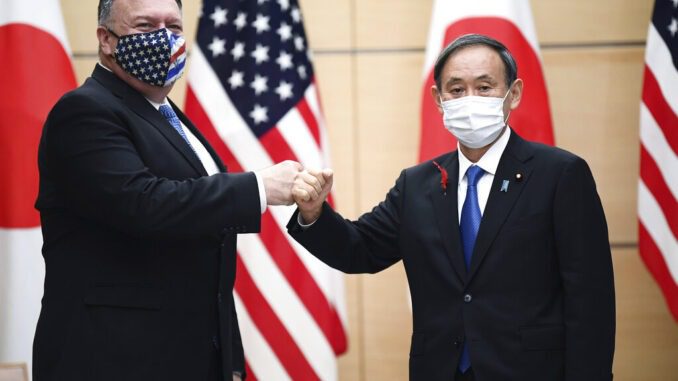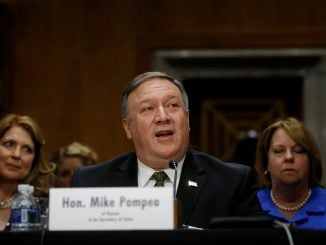
TOKYO — U.S. Secretary of State Mike Pompeo said Tuesday that China’s increasingly assertive actions across the region make it more critical than ever for four Indo-Pacific nations known as the Quad to cooperate to protect their partners and their people from Chinese “exploitation, corruption and coercion.”
Pompeo made the remark at a meeting in Tokyo with the foreign ministers of Japan, India and Australia, who together make up the Quad. The talks were the group’s first in-person meeting since the coronavirus pandemic began.
Pompeo accused China of covering up the pandemic and worsening it, while threatening freedom, democracy and diversity in the region with its increasingly assertive actions.
“It is more critical now than ever that we collaborate to protect our people and partners from the Chinese Communist Party’s exploitation, corruption and coercion,” Pompeo said. “We see in the East and South China Seas. The Mekong, the Himalayas, the Taiwan Strait. These are just a few examples.”
The talks came weeks before the U.S. presidential election and amid tensions between Washington and Beijing over the coronavirus, trade, technology, Hong Kong, Taiwan and human rights. They follow a recent flareup in tensions between China and India over their disputed Himalayan border, while relations between Australia and China have also deteriorated in recent months.
Japan, meanwhile, is concerned about China’s claim to the Japanese-controlled Senkaku Islands, called Diaoyu in China, in the East China Sea. Japan also considers China’s growing military activity to be a security threat. Japan’s annual defense policy paper in July accused China of unilaterally changing the status quo in the South China Sea, where it has built and militarized manmade islands and is assertively pressing its claim to virtually all of the sea’s key fisheries and waterways.
China has denied allegations of covering up the pandemic, saying it acted quickly to provide information to the World Health Organization and the world. It says the U.S. is the biggest aggressor in the South China Sea. Beijing also denies human right violations in its handling of Hong Kong and minority Muslims in Xinjiang, and accuses Western nations of meddling in its internal affairs.
Earlier Tuesday, new Japanese Prime Minister Yoshihide Suga said in a meeting with the Quad diplomats that their “Free and Open Indo-Pacific” security and economic initiative is more important than ever amid challenges from the coronavirus pandemic.
The international community faces multiple challenges as it tries to resolve the pandemic, and “this is exactly why right now it is time that we should further deepen coordination with as many countries as possible that share our vision,” Suga said, without directly criticizing China.
Japan and the U.S. have been pushing the FOIP as a way to bring together “like-minded” countries that share concerns about China’s growing assertiveness and influence.
Pompeo, as well as Australian Foreign Minister Marise Payne, Indian Minister of External Affairs Subrahmanyam Jaishankar, and their Japanese counterpart, Toshimitsu Motegi, held talks after meeting Suga together.
Pompeo earlier met one on one with his three counterparts, meetings in which according to the State Department reaffirmed the importance of cooperating among them to advance peace, prosperity and security in the Indo-Pacific.
Pompeo in his talks with Payne shared concerns about “China’s malign activity in the region,” while agreeing on the importance of the Quad discussions for “the promotion of peace, security and prosperity in the Indo-Pacific,” according to the State Department.
Pompeo was the only one who explicitly criticized China in opening remarks at the Quad meeting. Others used more nuanced language to describe the significance of promoting the concept of the FOIP as an inclusive, rule-based, democratic order that respects territorial sovereignty and peaceful resolution of disputes, rather than making allegations against China.
Motegi said after the talks that the Quad members agreed to meet regularly and cooperate in infrastructure building, maritime security, cybersecurity and other areas, and exchange views on the situation in regional seas. Motegi said he proposed to other ministers that the Quad should broaden its cooperation with other countries.
Suga, who had been chief Cabinet secretary under Abe, told Japanese media Monday that he will pursue diplomacy based on the Japan-U.S. alliance as a cornerstone and “strategically promote the FOIP,” while establishing stable relations with neighbors including China and Russia.
Suga has little experience in diplomacy. Balancing between the U.S., Japan’s main security ally, and China, its top trading partner, will be tough, analysts say.



